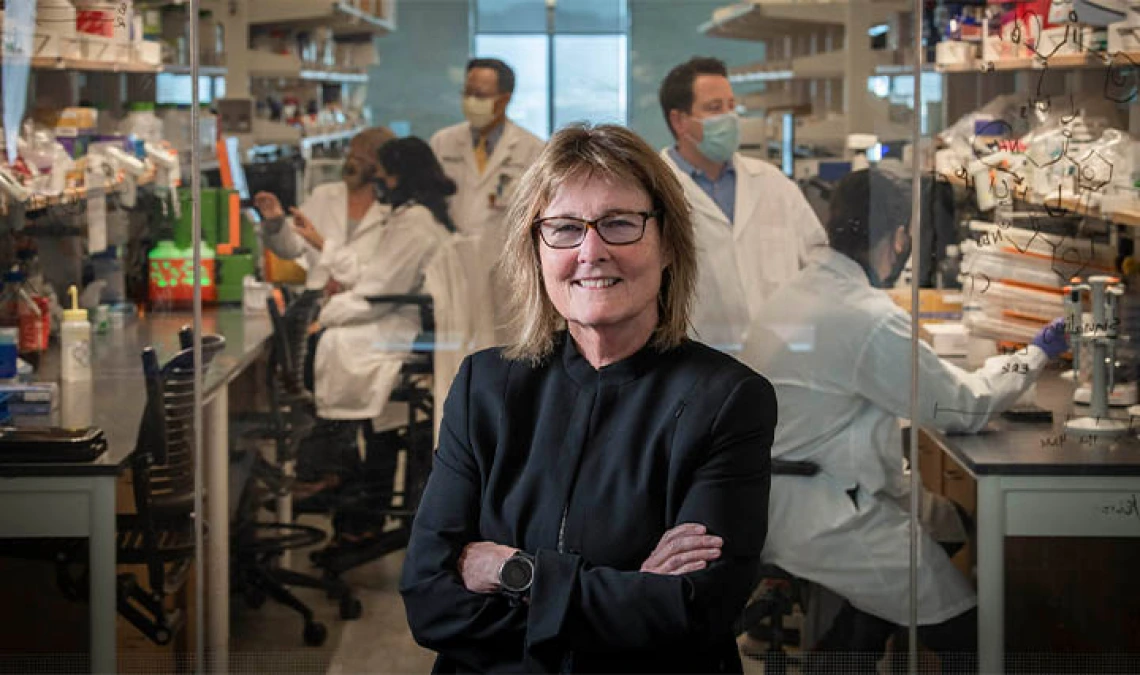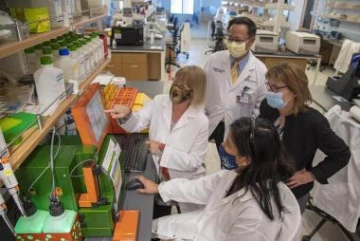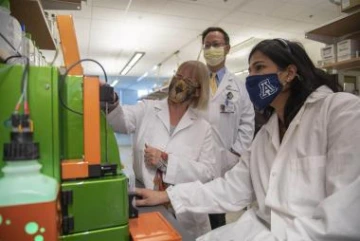Training the Next Generation of Cancer Scholars
The University of Arizona Cancer Center pairs future translational scientists with mentors who teach them how to bridge the bench and the bedside.

Training tomorrow’s cancer researchers is a responsibility taken personally by Anne E. Cress, PhD, a University of Arizona Cancer Center member and senior associate dean for academic faculty and basic science research at the College of Medicine – Tucson.
Dr. Cress is one of 11 founding faculty members of the Cancer Center, which has maintained an active National Cancer Institute (NCI) training grant, known as a T32, since 1978. The grant supports institutions in developing or enhancing research training opportunities for pre- and postdoctoral fellows in cancer research.
“This training program is specifically for students who we know have great promise to become the next generation of cancer researchers in an academic setting,” Dr. Cress said. “These are very advanced students, and each year they compete for these slots within our program.”
Creating a collaborative cancer scholar program
While the Cancer Center’s T32 has been continually funded for decades, the program has evolved. A successful application for this NCI funding requires a modified proposal each cycle. Once awarded, the grant is funded for five years.
Dr. Cress, along with College of Medicine – Tucson colleagues and co-principal investigators Gregory C. Rogers, PhD, associate professor and associate department head for faculty development of cellular and molecular medicine, and Clara N. Curiel-Lewandrowski, MD, professor of medicine and interim chief of the Division of Dermatology, used the latest award to establish the Integrated Cancer Scholars training program (ICS).

Dr. Cress joins doctoral student Shekha Tahsin and mentors Drs. Miranti and Lee.
ICS is an innovative pre-doctoral fellows training program that embraces a paired-mentor team approach to maximize the impact and significance of cancer research. Specifically, scholars choose one basic science mentor and one clinical science mentor from among nationally competitive basic scientists and physician-scientists.
“This is something we as researchers talk about doing all the time, but rarely does it actually happen,” Dr. Cress said. “The future of cancer research is becoming more and more a translational focus. The only way we can actually do that is by having physicians as part of the team. It’s a wonderful opportunity for our students to take a leading role in this collaboration.”
Each scholar is expected to conduct original research under the guidance of their chosen mentor-pair, and to participate in clinical cases with their chosen physician mentor. Each trainee’s progress is ensured through compulsory committee meetings and annual evaluations by the mentor-pair. Scholars also participate in career development and national networking opportunities, including hosting thought leaders in the Cancer Center’s Cancer Biology Seminar Series, acquiring new targeted skills in educational workshops, and community engagement with oncologists and biotechnology experts.
Translating cancer research
Shekha Tahsin, a fourth-year doctoral student in the Cancer Biology Graduate Interdisciplinary Program (CBIO GIDP), is one of six scholars participating in the first year of the ICS program.
Already a student in the lab of Cindy K. Miranti, PhD, chair of the CBIO GIDP, co-leader of the Cancer Biology Program (CBP) at the Cancer Center and member of the BIO5 Institute, who has been studying prostate cancer for 25 years, Tahsin applied to the ICS program to advance her research on discovering better ways to identify biomarkers that can be a used as a predictor for prostate cancer treatment and diagnosis.
20211702-t32-nhg_3256-inline.jpg

Along with mentors Drs. Miranti and Lee, doctoral student Shekha Tahsin is conducting research that may be a used for prostate cancer treatment and diagnosis.
Tahsin and Dr. Miranti are focusing on the function of the androgen receptor found in a particular type of cell, known as stromal cells, in the connective tissue of the capsule that surrounds the prostate. In the normal prostate, hormones called androgen bind to receptors in the stromal cells to maintain normal prostate function. However, in prostate cancer, the androgen receptor in the stromal cells is lost, disrupting normal function and contributing to cancer growth. By understanding how the loss of the androgen receptor in the stroma contributes to cancer development, Tahsin hopes to identify biomarkers that can predict prostate cancer in patients.
To conduct physiologically relevant research, Tahsin needs the clinical sciences perspective and access to human tissues specific to the prostate. That is where her clinical mentor, Benjamin R. Lee, MD, interim chair for the Department of Urology at the College of Medicine – Tucson, comes into play.
During surgery, Dr. Lee and his urology department collect prostate cancer tissues, which are registered and annotated into a biorepository for Tahsin and other researchers, fostering a collaborative relationship between the basic scientists in the lab and the clinicians treating patients.
“We want to help the entire institution because the biorepository helps support translational research between the clinicians and the basic scientists.”Benjamin R. Lee, MD, interim chair for the Department of Urology
“We’ve had an initiative for programmatic development to grow our prostate cancer program, both with expansion of robotic surgery for high-risk disease, but also to create a multidisciplinary team involving medical oncology, radiation oncology, pathology and radiology to better understand, diagnose and manage this disease,” Dr. Lee said.
“One goal of the Department of Urology is to help foster collaboration between surgeons, basic scientists, graduate students, medical students and residents in this multidisciplinary approach. We want to help the entire institution because the biorepository helps support translational research between the clinicians and the basic scientists.”
An added benefit of the ICS program is that it turns ideas into reality for the mentors. Drs. Miranti and Lee had previously discussed isolating prostate cancer tumor cells, but with Tahsin’s project, those conversations have become more concrete.
“It’s taking the interaction that we had already started and expanding it,” Dr. Miranti said. “Shekha is the focal point because she is the one receiving the funding and support for her research. But it also establishes this connection for us as scientists and clinicians that can go beyond this project.”
The next generation
Participating in the training program has provided Tahsin with a foundation for a career in cancer research. “The collaboration with Dr. Lee is helping me a lot,” Tahsin said. “My findings in the research lab can be correlated with the clinical setting. This is helping shape my career because my ultimate goal is to find molecular markers that will improve diagnosis and treatment for prostate cancer patients.”
Creating that translational foundation is a unique opportunity for Tahsin and the other students in the program.
“It takes a special kind of person to do translational work,” Dr. Cress said. “They not only have to understand the basic sciences, but they have to understand the way to translate it. I have clinical colleagues who really know the clinical aspects of Disease X, and I know the basic science part of it, but together, we need someone who’s the go-between, somebody who’s got feet in both worlds.”
2020-21 Integrated Cancer Scholars and Mentor Teams
Dakota Ramirez, doctoral student
Program: Immunobiology
Project: Immune system regulation of inflammation in head-and-neck squamous cell carcinomas
Mentors: Julie Bauman, MD, MPH, deputy director of the UArizona Cancer Center, and Justin Wilson, PhD, assistant professor of immunobiology at the College of Medicine – Tucson and a member of the BIO5 Institute.
Carley Cabel, doctoral student
Program: Cancer Biology
Project: Genetic interaction of CLK3 with the Wnt/B-catenin pathway in colorectal cancer
Mentors: Juanita Merchant, MD, division chief of gastroenterology, and Curtis Thorne, PhD, assistant professor of cellular and molecular medicine at the College of Medicine – Tucson, both of whom are members of the BIO5 Institute.
Corbin Jensen, doctoral student
Program: Cancer Biology
Project: PIM kinases in hypoxia-induced prostate cancer invasion
Mentors: Andrew Kraft, MD, director emeritus and professor of medicine, and Noel Warfel, PhD, assistant professor of cellular and molecular medicine at the College of Medicine – Tucson.
Trace Jones, doctoral student
Program: Cancer Biology
Project: Targeting the NEDDylation pathway to improve outcomes in HNSCC
Mentors: Julie Bauman, MD, MPH, deputy director of the UArizona Cancer Center, and Steffan Nawrocki, PhD, associate professor of medicine at the College of Medicine – Tucson.
Reeba Varghese, doctoral student
Program: Cancer Biology
Project: GSK3 kinase as a therapeutic target in colorectal cancer; drug resistance
Mentors: Aaron Scott, MD, assistant professor of medicine, and Curtis Thorne, PhD, assistant professor of cellular and molecular medicine at the College of Medicine – Tucson.
Shekha Tahsin, doctoral student
Program: Cancer Biology
Project: Loss of stromal androgen receptor regulation in prostate cancer
Mentors: Benjamin Lee, MD, interim department chair of urology, and Cindy Miranti, PhD, professor of cellular and molecular medicine at the College of Medicine – Tucson and a member of the BIO5 Institute.




